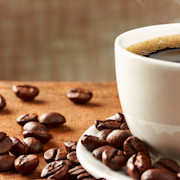- Science News
- Neuroscience
- Alcohol and problems remembering: can caffeine help?
Alcohol and problems remembering: can caffeine help?

Roasted coffee beans. Shutterstock
Recent study challenges the view that the negative side effects of these drugs can be cancelled out when they are taken together.
— By Radhaika Kapur
French novelist Honore de Balzac described coffee’s effect as: “Ideas begin to move like the battalions of the Grand Army on the battlefield, and the battle takes place. Things remembered arrive at full gallop, ensign to the wind.” Indeed, caffeine is a brain stimulant used by many to overcome fatigue and increase productivity. Highly caffeinated drinks are now commonly consumed together with alcohol, and this work explores a very current concern: does this counteract the negative effect of alcohol on memory?
A study recently published in Frontiers in Behavioral Neuroscience indicates that despite its impact on alertness and concentration, caffeine cannot counteract the memory deficits that result from alcohol consumption.
“Our results in mice show that even at low doses that do not change social behavior, alcohol causes amnesic effects. This, in turn, was found to not be counteracted by caffeine consumption,” says Dr Laura López-Cruz, first author of the study undertaken at Universitat Jaume I (Spain) and currently researcher in the Psychology Department of the University of Cambridge.
“Caffeine and alcohol are known to have common mechanisms in the brain. However, this finding forces us to question what we do not know about their biochemistry,” summarizes Lopez-Cruz.
The results draw into question what we know about a key brain chemical system: the adenosine system. This system regulates sleep, social interaction and social memory. Consuming alcohol increases the amount of adenosine present in the brain, inducing sleepiness and impairing long-term social memory. In contrast, caffeine blocks the activity of adenosine, increasing alertness and anxiety levels.
Due to opposing physiological and behavioral effects of alcohol and caffeine, it was expected that caffeine would counteract a key negative side effect of ethanol ingestion: namely issues with social memory.
People frequently face difficulty with remembering conversations and other behaviors that have taken place during alcohol consumption, an affect not reserved to heavy drinkers. Understanding these amnesic episodes, which pose a risk to personal safety, and if they can be prevented is therefore of great importance.
The researchers investigated memory in mice through a social recognition task (see figure 1), based on the tendency of healthy rodents to prefer exploring and interacting with other animals from the same species upon a novel encounter.
Each test animal was initially given either caffeine, alcohol or a combination, then placed in a chamber with another mouse, stranger to the test animal on one side, and an object on the other side, for the test animal to explore during 10 minutes. A day later, when any effects of the drugs should have worn off, the mice were placed back in the chamber, but another novel mouse now replaced the object. Hence the experimental mice were given the choice of interacting with a familiar mouse from the previous day, or a novel mouse.

Figure 1: Mice were placed in a chamber to assess their social memory. Used with permission from Laura Lopez-Cruz et al, 2016.
“We used the amount of time sniffing each mouse as an index of social recognition,” Lopez-Cruz explains. “If the mouse remembers the previous day’s encounter, they should spend more time sniffing the novel mouse.”
When treated with caffeine, mice spent more time exploring a novel conspecific. In contrast, when a mouse had been treated with alcohol, they spent equal amounts of time with novel and familiar mice, suggesting that the drug had impaired their memory. Most notable was the finding that mice who had been injected with a combination of alcohol and caffeine also did not differentiate between the novel and familiar mouse, demonstrating impaired social memory.
Previous research had found that low doses of caffeine did improve ethanol induced memory impairment. This led Lopez-Cruz and colleagues to suggest that high doses of caffeine may have more widespread effects that are not yet fully understood.
As the popularity of highly caffeinated drinks continues to rise, with 68% of adolescents consuming them according to the European Food Safety Authority (2011), these results provide an insight into how they cannot be relied on to balance out the negative effects of alcohol.
Read the full research article: Lopez-Cruz L, San-Miguel N, Bayarri P, Baqi Y, Müller CE, Salmone JD and Correa M (2016) Ethanol and Caffeine Effects on Social Interaction and Recognition in Mice: Involvement of Adenosine A2A and A1 Receptors, Front. Behav. Neurosci. 10:206 https://doi.org/10.3389/fnbeh.2016.00206
This research was published in the Frontiers Research Topic “Ethanol, Its Active Metabolites, and their Mechanisms of Action: Neurophysiological and Behavioural Effects” a collection of articles which explores the diverse effects of ethanol in different brain areas, as well as possible mechanism of action on different intracellular systems.








